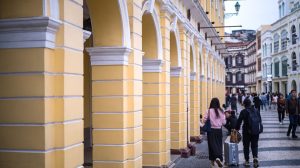Prostitution activity in Macao is generally regarded by locals as a “permanent” feature of the local surroundings: the idea of eliminating it through legislation is considered “infeasible”. That thought-provoking conclusion is part of a study looking into locals’ attitudes towards prostitution activity in Macao.
The research involved Dr. Joe Yong Zhou – currently an Assistant Professor at IFTM – in partnership with Dr. Yan Libo from the Macau University of Science and Technology, and Dr. Bill Xu from the Hong Kong Polytechnic University. It was based on data collected via a telephone survey completed by 358 Macao residents.
The researchers concluded that “the overall attitude of respondents toward sex tourism in Macao shows a certain degree of tolerance, which somewhat serves as encouragement for the Government to take measures to manage this sector”.
The scholars said that, based on their findings, adopting an approach of legalisation regarding prostitution in Macao would be “slightly better” than opting for a ban. “With appropriate regulations, sex tourism can be developed in a beneficial manner by eliminating human trafficking and forced sex, preventing threats to public health, and satisfying various stakeholders,” they argued. The researchers mentioned other international destinations had pursued such paths.
The comments were featured in the research paper “Residents’ attitudes toward prostitution in Macau”. It was published in 2018 in the Journal of Sustainable Tourism.
Prostitution is not illegal in Macao as long as an individual selling sexual services does so in a private place. But several activities related to the selling of sexual services are illegal. Soliciting for customers is a crime and organised prostitution is also illegal.
Striking a balance
The study findings pointed to a positive relationship between “acceptance of sex tourism” and a “tolerance” among locals of certain negative effects related to tourism, the researchers stated. Such tolerance was associated with locals’ perception of their general quality of life, they added.
“The existence of a link between acceptance of sex tourism and tolerance of negative impact is of theoretical importance to the governance of the sex trade,” the scholars wrote. Residents’ degree of either “acceptance” or “tolerance” of sex tourism might be heightened by “the elimination or alleviation of the social problems that revolve around the illegal sex trade, such as human trafficking, forced sex, illegal inns, illegal promotion of prostitution, and threats to security and public health.”
The researchers said their findings indicated Macao locals appeared to be more concerned about the social problems related to prostitution than to moral issues linked to such activity. “In this sense, prostitution-related social problems are preoccupations for the Government, but the relevant social problems are difficult to eliminate or alleviate without dealing with the source, that is, the illegal sex trade,” said the scholars.
“The Government must face the dilemma of implementing measures to administrate” control over “the problematic area of the sex trade” in order to “alleviate the related social problems and decrease relevant criminal activities,” they added.
The study also found that cultural attitudes had a significant effect on locals’ perceptions of sex tourism and prostitution. Those espousing less diversified cultural values were more likely to oppose such activities. Such influence “overshadows the supposed roles of education and age” on “acceptance” of prostitution activity, the authors wrote.
The scholars said their research aimed to serve “as an initial step in understanding the opinions of the local community on sex tourism.” They pointed out that, similar to other international destinations, prostitution in Macao had been “flourishing” in recent years in line with a rapid increase in the volume of tourism. In Macao’s case, prostitution had been fuelled also by the growth of the city as a casino market, said the researchers.
More info
Dr. Bill Xu is a Senior Lecturer at the School of Professional Education and Executive Development of the Hong Kong Polytechnic University. He has a PhD from the Hong Kong Polytechnic University. His research interests include consumer behaviour and consumption experience in tourism and hospitality, tourism psychology and sociology, tour operations and wholesaling, and tourism and hospitality business in China.
Dr. Joe Yong Zhou is an Assistant Professor at IFTM. He holds a PhD from the Hong Kong Polytechnic University. His research interests include tourism impact analysis, destination development, MICE (meetings, incentives, conferences and exhibitions) and event management, and tourist behaviour analysis.
Yan Libo, Bill Xu Jing and Joe Zhou Yong: “Residents’ attitudes toward prostitution in Macau”, Journal of Sustainable Tourism, Volume 26, Issue 2, pages 205-220, 2018.
http://dx.doi.org/10.1080/09669582.2017.1338293









